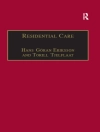This lively and accessible text provides an introduction to the history of crime and crime control. It explains the historical background that is essential for an understanding of contemporary criminal justice, and examines the historical context for contemporary criminological debates.
Topics covered include:
- Crime statistics
- Constructions of criminality
- Policing
- Prisons
- Surveillance
- Governance
- White-collar crime
- Immigration and crime
For each topic, the book provides an overview of current research, comment on current arguments and links to wider debates.
The Key Approaches to Criminology series celebrates the removal of traditional barriers between disciplines and, specifically, reflects criminology’s interdisciplinary nature and focus. It brings together some of the leading scholars working at the intersections of criminology and related subjects. Each book in the series helps readers to make intellectual connections between criminology and other discourses, and to understand the importance of studying crime and criminal justice within the context of broader debates.
The series is intended to have appeal across the entire range of undergraduate and postgraduate studies and beyond, comprising books which offer introductions to the fields as well as advancing ideas and knowledge in their subject areas.
Table des matières
History, Criminology and ′Historical Criminology′
The History of Criminal Statistics
Police Governance – Enforcement, Discretion, Professionalism and Accountability
Changing Perceptions of Criminality
Immigration, Ethnicity, Race and Crime
Surveillance:
From the Workplace to the Streets?
Incarceration and Decarceration
Conclusion
A propos de l’auteur
Barry Godfrey began his career at Keele University in 1995, leaving as Professor of Criminology in 2011. He was then appointed Professor of Social Justice at the University of Liverpool to research comparative and historical criminology and carry out duties as Associate Pro Vice Chancellor for the Faculty of Humanities and Social Sciences. During his career, Barry has published twenty sole- and co-authored books, edited collections of essays and edited special issues of several journals. He has an international reputation, being awarded visiting and honorary appointments at the universities of Tasmania, Western Australia, New England, and Xi’an Jiaotong Liverpool. He is Inaugural Research Fellow of the Howard League for Penal Reform; and now works with researchers in North America, Australia, New Zealand, China and the Netherlands on a variety of historical and modern criminological issues.












